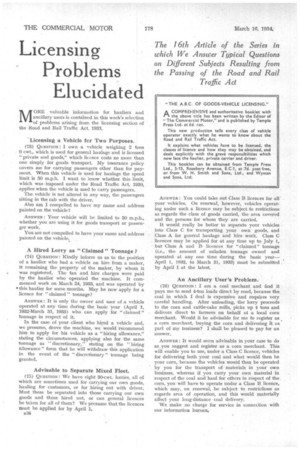Licensing Problems Elucidated
Page 46

If you've noticed an error in this article please click here to report it so we can fix it.
The 16th Article of the Series in which We Answer Typical Questions on Different Subjects Resulting from the Passing of the Road and Rail Traffic Act
MORE valuable information for hauliers and ancillary users is contdined in this week's selection of problems arising from the licensing section of the Road and Rail Traffic Act, 1933.
'Licensing a Vehicle for Two Purposes.
(73) QUESTION: I own a vehicle weighing 2 tons 9 cwt., which is used for general haulage and is licensed "private and goods," which licence costs no more than one simply for goods transport. My insurance policy covers me for carrying passengers other than for payment. When this vehicle is used for haulage the speed limit is 30 m.p.h. I want to know whether this limit, which was Imposed under the Road Traffic Act, 1930, applies when the vehicle is used to carry passengers.
The vehicle is not altered in any way, the passengers sitting in the cab with the driver.
Also am I compelled to have my name and address painted on the vehicle?
ANSWER: Your vehicle will be limited to 30 m.p.h., whether you are using it for goods transport or passenger work.
You are not compelled to have your name and address painted on the vehicle..
A Ifired Lorry as " Claimed " Tonnage ?
(74) QUESTION : Kindly inform us as to the position of a haulier who had a vehicle on hire from a maker, it remaining the property of the maker, by whom it was registered. The fax and hire charges were paid by the haulier who operated the machine. It commenced work on March 24, 1933, and was operated by
• this haulier for some months. May he now apply for a licence for " claimed" tonnage?
ANSWER : It is only the owner and user of a vehicle operated at any time during the basic year (April 1, 1932-March 31, 1933) who can apply for " claimed " tonnage in respect of it.
In the case of your client who hired a vehicle and, we presume, drove the machine, we would recommend him to apply for his vehicle as a "hiring allowance," stating the circumstances, applying also for the same tonnage as "discretionary," stating on the "hiring allowance" form that he will withdraw this application in the event of the " discretionary " tonnage being granted.
Advisable to Separate Mixed Fleet.
(73) QUESTION: We have eight 30-cwt, lorries, all of which are sometimes used for carrying our own goods, hauling for customers, or for hiring out with driver. Must these be separated into those carrying our own goods and those hired out, or can general licences be taken for all of them? We presume that the licences must be applied for by April 1.
B36
ANSWER: You could take out Class B licences for all your vehicles. On renewal, however, vehicles operating under such a licence may be subject to restrictions as regards the class of goods carried, the area covered and the persons for whom they are carried.
It would really be better to separate your vehicles into Class C for transporting your own goods, and Class A for general haulage and hire work, Class C licences may be applied for at any time up to July 1, but Class A and B licences for "claimed" tonnage (i.e., the amount of unladen tonnage owned and operated at any one time during the basic year— April 1, 1932, to March 31, 1933) must be submitted , by April 1 at the latest.
An Ancillary User's Problem.
(76) QUESTION: I am a coal mechant and find it pays me to send 4-ton loads direct by road, because the coal in which I deal is expensive and requites very careful handling. After unloading, the lorry proceeds to the corn and cattle-cake mills, picks up 4 tons and delivers direct to farmers on behalf ol a local corn merchant. Would it be advisable for me to register as a corn merchant, buying the corn and delivering it as part of my business? I shall be pleased to pay for an answer.
ANSWER: It would seem advisable in your case to do as you suggest and register as a corn merchant. This will enable you to use, under a Class C licence, vehicles for delivering both your coal and what would then be your corn, because the vehicles would then be operated by you for the transport of materials in your own business, whereas if you carry your own material in respect of the coal and haul for others in respect of the corn, you will have to operate under a Class B licence, which may, on renewal, be subject to restrictions as regards area of operation, and this would materially affect your long-distance coal delivery.
We make no charge for service in connection with our information bureau.




















































































